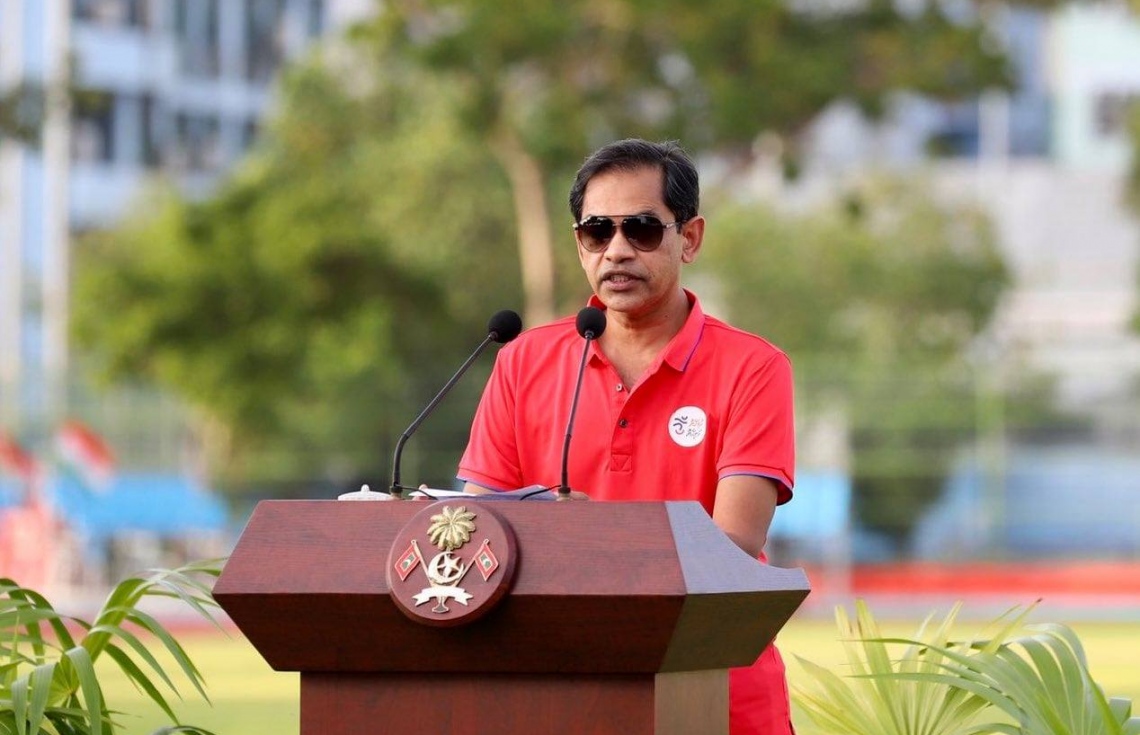Over the years Maldives has joyfully taken part in various festivities held to mark India’s Independence Day and is surely one amongst many collaborations that stand testament to the historically close relations between the two nations.
As India gears up to celebrate the 75th anniversary of the country’s Independence, The Times of Addu reached out to find out more about the High Commission (HC)’s plans to mark the momentous occasion in Maldives this year, and the opportunity to gain a deeper understanding of the ties between both nations, through India’s looking glass.
Speaking on behalf of the Indian High Commission, the High Commissioner of India to the Maldives Sunjay Sudhir deliberated on a range of questions posed by The Times of Addu.
Celebrating 75 years of Independence
Noting that a year-long commemoration was planned to celebrate victory after 200 years of colonial rule on August 15, 1947, HC Sudhir revealed that the HC, together with the Indian Culture Center (ICC), intends to organize multiple events, all of which commence in July 2021.
“These will include painting competitions, music programmes, seminars and lectures, etc. Our wish is for Maldivians to participate wholeheartedly in these events and share their thoughts and display their talents.” said the High Commissioner, adding that a complete calendar of events is being prepared and “will be shared with the public by ICC shortly.”
However, in consideration of the COVID19 situation, he said that some of the events may be hosted virtually.
Shifting the focus to the sentiment of the occasion, the High Commissioner deliberated on what ‘75 years of Independence’ meant for India, particularly in times as precarious and turbulent as the last three years, and how to deliver an even better future.
HC: “Like the Maldives, India is also a youthful nation of 1.4 billion people with a median age of 26 years.”
“The Government of India prioritises economic growth and development to fulfil the aspirations of a young population and to foster the unity in our cultural, religious, linguistic and geographical diversity.”, he emphasized.
Speaking about the issue of environment and India’s own climate change initiatives he said,“[India is] perhaps the only large country which is on track to meet its Paris Agreement targets. Our solar power ambitions have grown in the recent past and India has set a target of 400 Gigawatts of solar power for 2024.”
As for the country’s forward approach to international relations, HC Sudhir iterated, “Neighbourhood First is a key pillar of India’s foreign policy”.
Renewed Relations
TOA: For many local and international observers, the Solih administration has successfully ‘renewed’ and ‘strengthened’ bilateral relations between both nations, a sentiment noted from Prime Minister Modi’s historic address at the People’s Majlis, and bolstered by the generous and timely donations in response to the ongoing pandemic.
At this time, opposition forces have also remarked on the timing and alleged souring of Maldives’ relationship with China.
Does India acknowledge this tipping of scales in its favour as a ‘either, or situation, or could it be chalked up to closer ties with the incumbent leadership?
HC: “India and Maldives have shared time-honoured bilateral relations. These relations are rooted in kinship, culture and history. Our people have traded with each other for centuries. For instance, trade relations existed between Lothal port in Gujarat and Maldivians more than 2500 years ago. Our languages share common origins. After both nations became independent, successive governments in India and the Maldives have worked to strengthen these ties for the mutual benefit of our peoples.
“Today, under the leadership of President Solih and Prime Minister Modi, our bilateral relations have evolved into a modern, multi-faceted and dynamic relationship anchored in the shared values of democracy and the rule of law.”
Referring to India’s Neighbourhood First Policy, HC Sudhir further elaborated, “Maldives has a special place in this. Maldives reciprocates this policy with its ‘India First’ policy.”
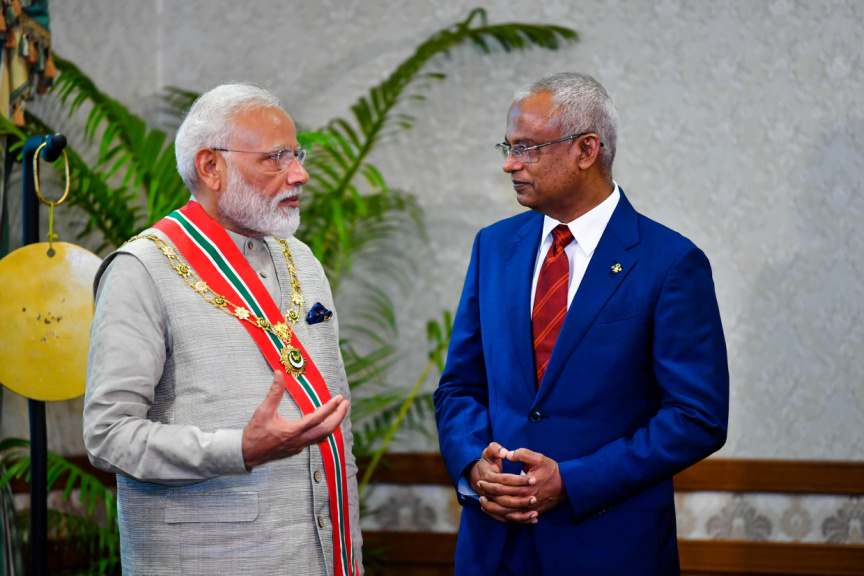
HC: “If you recall, PM Modi’s first State Visit abroad in his second term was to the Maldives in June 2019. Speaking on the People’s Majlis floor, PM Modi referred to the Inauguration Ceremony of President Solih in November 2018 and said ‘…That ceremony was an overwhelming experience. I felt first-hand the energy of true democracy in the Maldives. That day, I witnessed the dedication and commitment of the common citizen of Maldives for democracy‘.”
One of the key focus areas for the India-Maldives partnership has been strengthening democratic institutions as per the HC.
HC: “India has extended assistance to the Maldives to strengthen democratic institutions in line with the priorities of the Government of President Solih. This includes capacity building and training programmes for the People’s Majlis, the Judiciary, various branches of the Executive including the Auditor General’s Office, The Election Commission, several Ministries, and also the security services such as the MNDF, the MPS, Maldives Customs, etc. Every year now, around 1000 Maldivians obtain training in various fields. Maldives receives more training/scholarship slots from India than from any other country.”
HC: “As a part of our broad-based political engagement, we also share views and thoughts with Opposition parties regularly. Our leaders meet with them when they visit the Maldives and listen to their perspectives. As the world’s largest democracy, we strongly believe in a multi-party democracy and in engagement with all parties across the political spectrum.”
Referring to the events of November 3, 1988, HC Sudhir called attention to the fact that since then, the historic defence and security partnership between India and Maldives have been strengthened through successive governments, with leaders recognizing that security for both nations is intertwined.
HC: “As close neighbours, we must continue to cooperate to stall the advance of growing threats to peace and security in the region, including terrorism, drug trafficking, illegal fishing, etc.”
HC: “Some of the milestones in our defence and security partnership included the gifting of the CGS Huravee in 2006, the donation of the Fast Interceptor Craft CGS Kaamiyaab in December 2019 the assistance given to the Senahiya Military Hospital, the gifting of equipment to MNDF and MPS on several occasions, and the joint surveillance and patrolling of the vast EEZ of Maldives by Indian and Maldivian forces for more than a decade. Training of MNDF and MPS personnel has been a longstanding pillar of our security cooperation. In recent times, we are also focused on cooperation in counter-terrorism which is a common threat to both our societies.”
HC: “India’s aim is to work with the security forces of the Maldives and strengthen their infrastructure and capacities to face contemporary security challenges. This is why we are focused on improving Maldivian training infrastructure such as the Composite Training Centre (CTC), Maafilaafushi of the MNDF inaugurated by PM Modi in June 2019, and the National College for Policing and Law Enforcement Studies (NCPLES) for the MPS in Addu which we hope to inaugurate in the coming weeks. Training is also a focus area for us when it comes to customs and immigration authorities in the Maldives.
HC: ” Under the USD 50 million Line of Credit Agreement signed with the Ministry of Defence during the visit of External Affairs Minister Dr S Jaishankar in February 2021, we hope to further strengthen the capacities of MNDF.”
Following the above statement, he reiterated that the security and defence partnership between India and Maldives is longstanding, and based on mutual understanding.
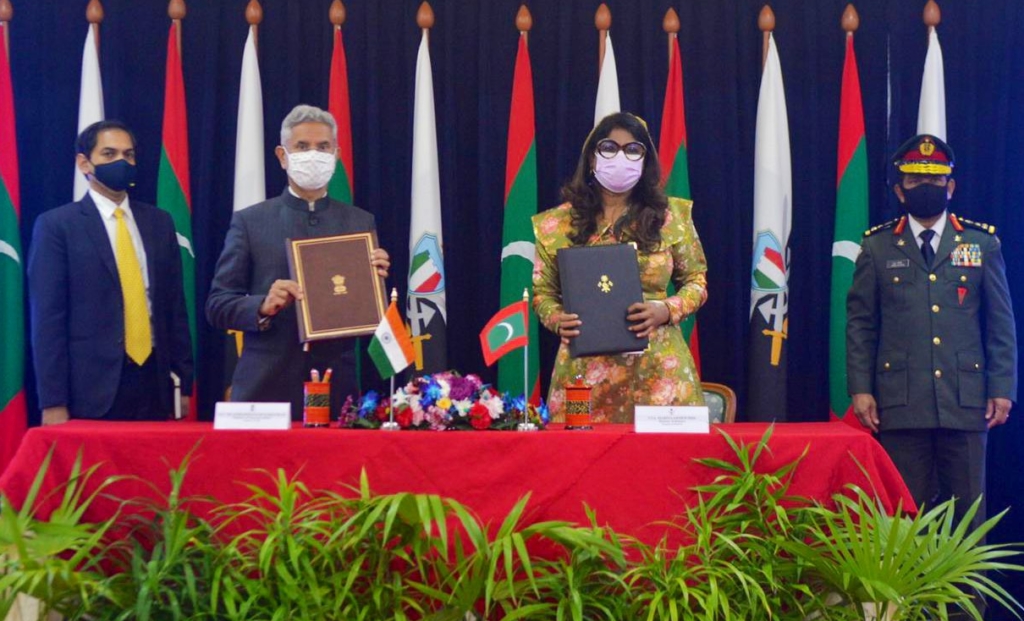
HC: “As neighbours we have to deal with these common threats together.”
HC: “Our partnership on the multilateral front has also grown. Today, we cooperate closely in regional for a such as the Indian Ocean Rim Association (IORA), and, within the UN. We are happy that the Maldives has received unprecedented global recognition and honour with the election of Foreign Minister Abdulla Shahid as the President of the 76th UNGA. This is a spectacular achievement for the Maldives.”
TOA: At this time, opposition forces have also remarked on the timing and alleged souring of Maldives’ relationship with China.
Does India acknowledge this tipping of scales in its favour as a ‘either‘ or situation, or could it be chalked up to closer ties with the incumbent leadership?
HC: “It would not be appropriate for me as the High Commissioner of India, to comment on Maldives’ relations with a third country.”
HC: “However, I must say that we are pleased that in the last two and half years, Maldives has strengthened and expanded its foreign relations with multilateral organizations like the Commonwealth, IORA, the UN and others as well as with numerous other countries. No wonder that FM Abdulla Shahid won the elections as President UNGA with a landslide – three-fourth majority. “
TOA: During Maldives’ time of need, India donated 200,000 doses of Covid-19 vaccine to Maldives, with which the island nation kicked off its vaccination efforts. Maldives also purchased an additional 300,000 doses from the Serum Institute of India, out of which 100,000 were delivered. However, due to the escalation of the situation in India, the remaining shipment has not been delivered yet.
Does India plan to donate additional vaccine doses to the Maldives, and how much can the country anticipate receiving? Could the HC comment on when India would start to deliver vaccines again?
HC: “India has always extended humanitarian assistance whenever the situation demanded. Ever since the pandemic began, both countries have collaborated to alleviate the suffering of Maldivians. In essence, the collaboration on vaccines was the feather in the cap of our partnership during the pandemic. On January 20, 2021, 4 days after India started its own vaccination programme, the Maldives received the first gift of 100,000 vaccine doses. In February 2021, EAM Dr S. Jaishankar gifted another 100,000 doses of vaccines to the Maldives.”
Thereafter, the Government of Maldives entered into a commercial arrangement with Serum Institute of India in March 2021.
HC: “SII supplied another 100,000 doses to the Maldives in March 2021, enabling Maldives to be among the top countries in the world in terms of percentages of populations vaccinated.”
On a sombre note he added, “Since then, a brutal second wave of the pandemic gripped India and strained our own vaccine production and delivery mechanisms. Despite this, we continue to work with international partners and vaccine companies to ensure that the vaccine needs of the Maldives are met. “
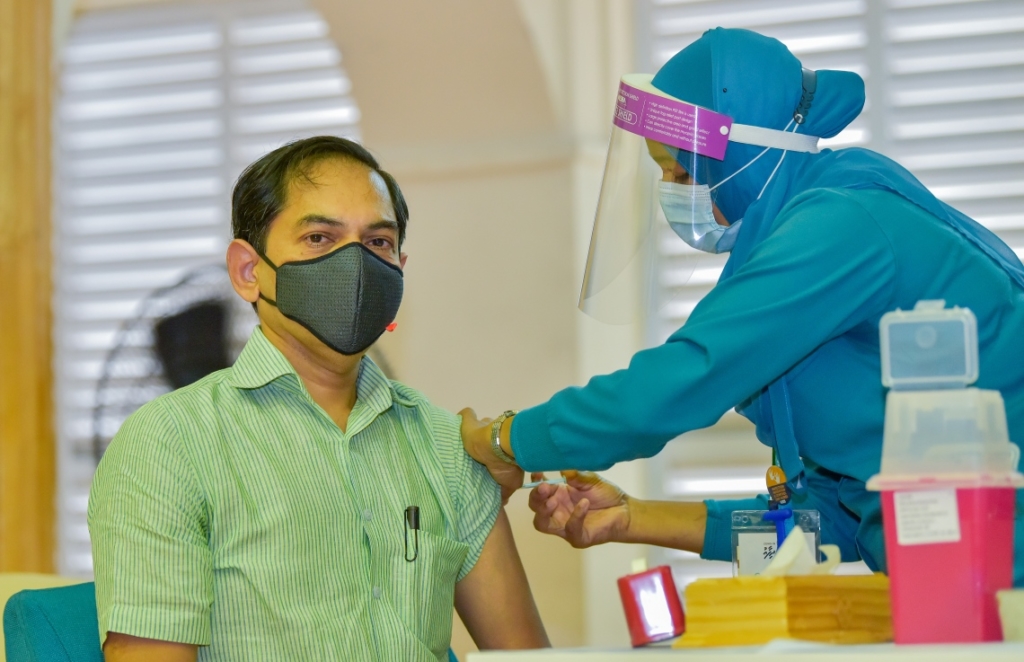
Addu Consulate
One of the most speculated issues in the Maldives-Indian political hemisphere of recent is the proposed establishment of an Indian Consulate in the southernmost Addu City. Campaigns emerged featuring “Save Addu” and “India Out” as slogans garnered public momentum.
While the Maldivain government has yet to publicize anything on the issue, TOA asked the HC to clarify India’s stance on the project and the plans related to it.
HC: “Alongside Consular services, a Consulate also functions to enhance trade, economic, cultural and scientific ties between countries, and strengthen the people-to-people relations between the nations.”
Stating that establishing a Consulate was of norm diplomatic relations, HC Sudhir referred to The Vienna Convention on Consular Relations of 1963, which governs the framework of consular relations and practices between two nations.
HC: “The Maldives has a Consulate functioning in Thiruvananthapuram since 2005. The Maldives also has Honorary Consuls in Bengaluru, Chennai, Mumbai, Kolkata and is proposing to open a Honorary Consul’s office in Hyderabad as well. This is a welcome initiative since is expands the presence of the Maldives in India and strengthens bilateral relations.”
HC: “As far as the proposal for establishing a Consulate in Addu is concerned, the Indian Cabinet has given approval as a part of our domestic approval process in May. A decision to establish the Consulate cannot be taken unilaterally. However, before proposing to the Government of Maldives, Indian government’s internal approval is necessary. This has been obtained. As President Solih mentioned in his press conference, the Government of Maldives is yet to give formal approval for the Consulate. Such decisions are taken through mutual consent and consultation.”
He went on to state that should Maldives approve the establishment of the Consulate, it would be in Addu, and also spoke on how this would benefit the city’s economy and the region as a whole.
HC: “Mainly this will include providing visas to Maldivians wishing to travel to India for various purposes such as medical treatment and education [in Atolls Addu, Fuvahmulah and Huvadhoo]. This is important because currently all visa seekers from the three atolls have to travel to Malé for obtaining visas. Since Addu accounts for the second largest number of visa seekers in the Maldives, presence of the Consulate will save them time, money and add to their convenience. The Consulate will also provide consular services to Indian nationals in the three atolls.”
According to the High Commissioner, the Consulate will assist in enhancing trade and economic ties, oversee the numerous development projects that India finances in the southern Maldives, and enhance people-to-people ties between both nations.
HC: “We are happy that STO/MSS has started a direct Ferry Service between Tuticorin and Addu and trade is increasing. With increasing trade there could be more flights, better connectivity and better prosperity to the Southern atolls.”
Other Projects
Making the most of this opportunity, TOA took the time to inquire about some of the projects, particularly those pertaining to the southern Maldives, namely the Addu Reclamation Project and the establishment of the ‘National College of Police and Law Enforcement in Addu City, or as it is more commonly known the ‘Addu Police Academy.
The Addu Reclamation Project happens to be among those listed for the USD 800 million Line of Credit from the Exim Bank of India, under the economic assistance package of USD 1.4 billion from India to Maldives. The package was announced during President Ibrahim Mohamed Solih’s visit to India in December 2018.
Till now, the bidding process for the Addu Reclamation Project commenced and the road construction is scheduled to begin in mid-July. In the past, people have raised the issue of continual delays concerning both projects. Residents of the city and locals across the archipelago have also raised their voices regarding the usage of cement in the paving of Addu roads and the environmental implications of such a reclamation project.
HC: “… through a consultative process, the Government of Maldives, the Government of India and the EXIM Bank of India selected consultants who prepared the Detailed Project Reports (DPR) for these projects. These DPRs were scrutinised by technical authorities in both countries. Once again, through a consultative process, qualified and financially-credible Indian companies were selected by the Government of Maldives for execution of these projects through a transparent bidding process.”
HC: “It is important for India, as a democratic country, as it is for the Maldives, to ensure that the entire process – selection of consultancy, preparation of the DPR, selection of a contractor through an open bidding process – is transparent, free from corruption, and adheres to the laws and rules of the Maldives,” assured the high commissioner.
He added that all the technical and environmental aspects of these projects were examined by authorities from both countries and that all are in accordance with the “rules prevailing in the Maldives.”
Reassuring the concerned citizens of Addu City, the High Commissioner said that despite the many travel and work restrictions faced by the contractors and the Maldivian government, they are confident that the projects in Addu will complete in time.
Since commencement, both Maldivian and Indian authorities have asserted more than one finishing date for the Addu Police Academy, with the Deputy High Commissioner of India to Maldives Shri Rohit Rathish alluding to a probable conclusion on March 29, 2021, during his visit to Addu City in March 2021.
However, as March passed by, much work seems to remain ahead, and construction seems ongoing.
TOA asked the High Commissioner to shed some light on the possible reasons for these delays and requested for clarifications on the most recent deadline for project conclusion and handover.
The National College for Policing and Law Enforcement Studies (NCPLES) is India’s largest grant project in the Maldives costing above USD 30 million. Successive Governments in Maldives have worked with India to implement this project.
HC: “The initial MoU was signed in 2012. However, the current site was identified in 2014 and handed over to the contractor in July 2016. Thereafter, the drawings were approved by July 2017. There were some difficulties with visas and work permits as well. However, th=e pace of work has progressed rapidly in the last 2 years and the project is at 93% completion.”
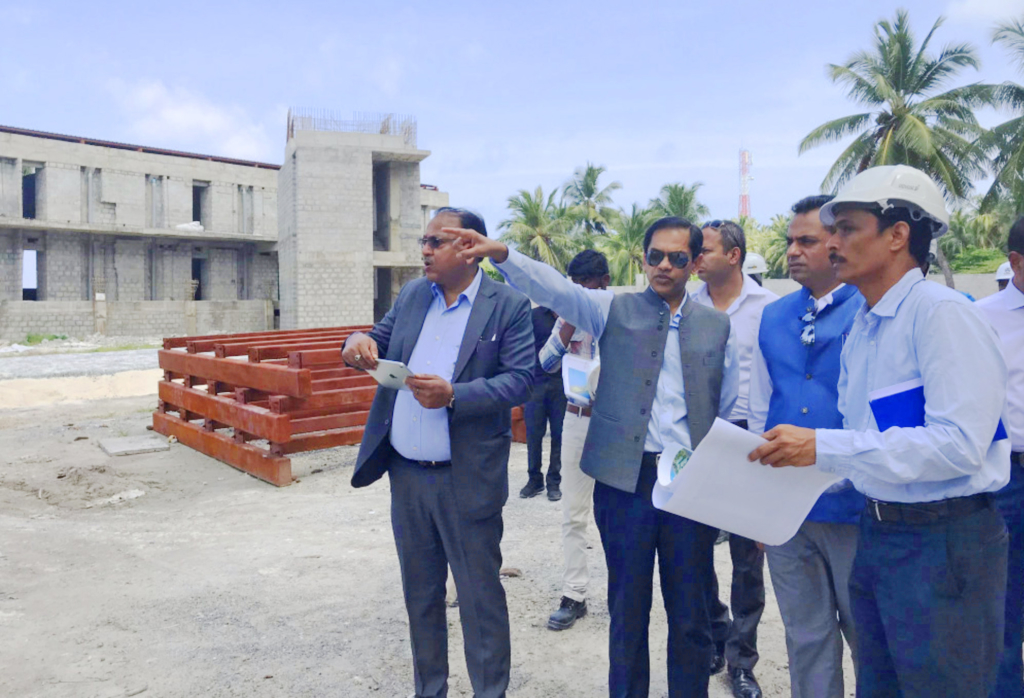
Noting that the project faced repercussions of COVID-19, with quarantine, and work permit restrictions with the first and second wave of the virus in India.
HC: “Regardless, we intend to jointly inaugurate this important facility in July 2021 and hand it over to the Government of Maldives for its use. The property will belong to the MPS. The NCPLES or the Addu Police Academy will be a state-of-the art training facility for the MPS and will serve the Maldivian nation for decades to come.”
Looking to the future
TOA: Undoubtedly, India has remained Maldives’ closest aid over the years. However, it does not go unnoticed that during the past three years South Asia’s superpower has provided numerous loans and grants in addition to several aid programs, more than ever before.
State finance declarations show a total of MVR 7,238.6 million in loans acquired from India’s EXIM Bank, between 2012 till 2023. At a glance, the figures are higher than the loans taken from the Chinese EXIM Bank across the same period.
Additionally, India has confirmed the provision of MVR 7,836 million as bilateral grants within the period of 2012 till 2023, cementing its place as the biggest creditor to the Maldives.
Of this, Maldives is set to receive a total of MVR 7,754.1 million between 2018 and 2023.
As per our sources, at a time of mounting political tensions in the previous administration, the Indian government had cracked down on the Maldivian government, applying certain pressures for the immediate repayment of a USD 50 million loan previously acquired from the State Bank of India, which was then settled via funds from the national reserve at Maldives Monetary Authority. As a smaller developing nation, the risk of debt distress, particularly in the context of foreign loans, has retained a place at the forefront of public discourse.
Could you elaborate on the differences, if there are any, in such loans extended to Maldives by the Indian EXIM Bank, compared to such financing from other countries?
Irrespective of previous allegations, as COVID19 continues to affect the global economy in unforeseen ways, can the Maldives remain confident that the recent loans from India will not be used as “political leverage” in the future?
“India’s development assistance to friendly nations across the world are based on the principles of partnership and transparency and is driven by the needs of the receiving country.” said the HC, reminding TOA that at present, India has extended nearly USD 30 billion in Lines of Credit to more than 62 countries.
The terms and conditions of India’s Lines of Credit are transparent and available on the EXIM Bank of India website. These are offered at a 1.75 percent interest rate and have a 5-year grace period and a 20-year repayment period. Thus EXIM Bank of India loans taken this year will have a grace period until 2026 and can be repaid at nominal interest rates before 2041. This is substantial time for the projects to be monetized and start delivering the intended economic benefits.
“On the question of debt, all countries, including India, borrow to finance their budgets and development needs”, said the HC stating the country’s position was that the money needed to be spent responsibly.
HC: “One has to look at the terms and conditions of debt, transparency, and how this money is being used by the Government. Basic economics informs us that investment in infrastructure by governments leads to growth in economies for the long-term. Long-term debt incurred by Governments, if spent responsibly on infrastructure and social welfare, leads to growth in the economy.”
India’s loans to the Maldives constitute long-term development finance, with stretched out repayment periods and low interest rates that will contribute to long-term growth in the economy.
HC: “As a friendly neighbouring country with longstanding relations, under the G-20’s Debt Service Suspension Initiative (DSSI), India has also deferred repayment of previous loans taken, for the Maldives. For instance, the repayment of the Standby Credit Facility of USD 100 million taken in 2011 was deferred in 2020.”
HC: “The concessional loan (at 3.5 percent interest) extended to Maldives in September 2020 as budgetary support to help the Maldivian economy has a repayment due at the end of 10 years. This is not only economical for the Government of Maldives but also gives it ample time to pay back. These are much better terms than the 7.5% interest rate of borrowing for the USD 250 million in bonds that Maldives borrowed in 2017 with a 5-year repayment period.”
HC: “We feel that the Government of Maldives has also been responsible in its debt strategy and has subscribed to mostly long-term debt to support the economy at a very difficult time.”, insisted the HC, whilst expressing his belief that consistent economic growth in the Maldives in the coming years would ensure and ease the timely repayment of such long-term debt.”
Circling back to the topic of India’s hard-earned independence, what sort of future does India envision for its neighbourhood? Which lessons does the South Asian leader wish to emphasize for these younger democracies, and their similar struggles for meaningful and sustainable growth?
What are some of the initiatives being planned for the future for India-Maldives relations?
Pointing out that South Asia is the least economically integrated region in the world, and that each country does more trade outside the region than it does with its neighbours, the High Commissioner said that investments also depict a similar story.
HC: “India’s effort will be to integrate the economies and derive maximum mutual benefit from partnerships through enhanced connectivity and commerce. The first direct cargo vessel service started in September 2020 between India and the Maldives has this same objective. This is the only direct cargo ferry service which India has with any of its South Asian neighbours.”
He highlighted that 12 voyages have been completed so far and that the service offers tangible benefits of complementarities and advantages of lower costs and times to businesspersons in both countries.
HC: “As mentioned earlier, it is also important for countries in the region to partner in strengthening democratic institutions. India and Maldives have set the standard for cooperation in this regard in the past few years. Under President Ibu Solih and Prime Minister Modi’s leadership, both countries have signed nearly 25 MoUs of which several involve the strengthening of institutions such as the Judiciary, the People’s Majlis, various Ministries, Election Commission, Auditor General’s Office, etc. The nurturing of these institutions will safeguard democracy in the Maldives, we believe.”
Expressing eagerness to enhance ‘people-to-people ties’ between both nations, the HC said that all the bilateral relations are to We also look forward to working on enhancing people-to-people ties between India and the Maldives. After all, bilateral relations are built on the foundation of ‘our people’s interests.
HC: “Indians accounted for about a quarter of all tourists visiting Maldives in 2020. We believe that this trend can continue in 2021 and beyond. The possibilities in tourism, trade and investment are endless once the infrastructure is set up and air and sea connectivity are improved.”
HC: “We are working with the Government of Maldives on several issues of mutual interest. MoUs for cooperation in the Audit and Fisheries sector are likely to be finalised soon. We are also working to finalise an MoU between the Islamic University of Maldives and the Aligarh Muslim University for exchange of students and faculty and joint research. In addition to the 30 ongoing or completed grant projects in the Maldives, we are looking to fund several more projects on islands through an HICDP Phase II scheme.”
The High Commissioner went on to conclude the interview on a rather optimistic note.
HC: “Of course, the timely execution of the Indian assisted projects, which cover a broad spectrum including housing, fisheries, roads, water and sanitation, port, bridges and sports is a high bilateral priority. The assets created for the Government of Maldives will be key drivers of the economy in the decades to come.”

